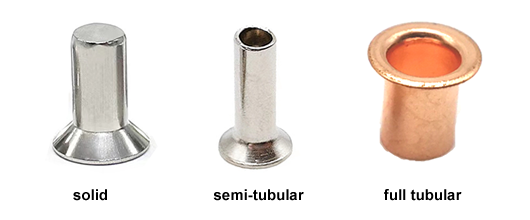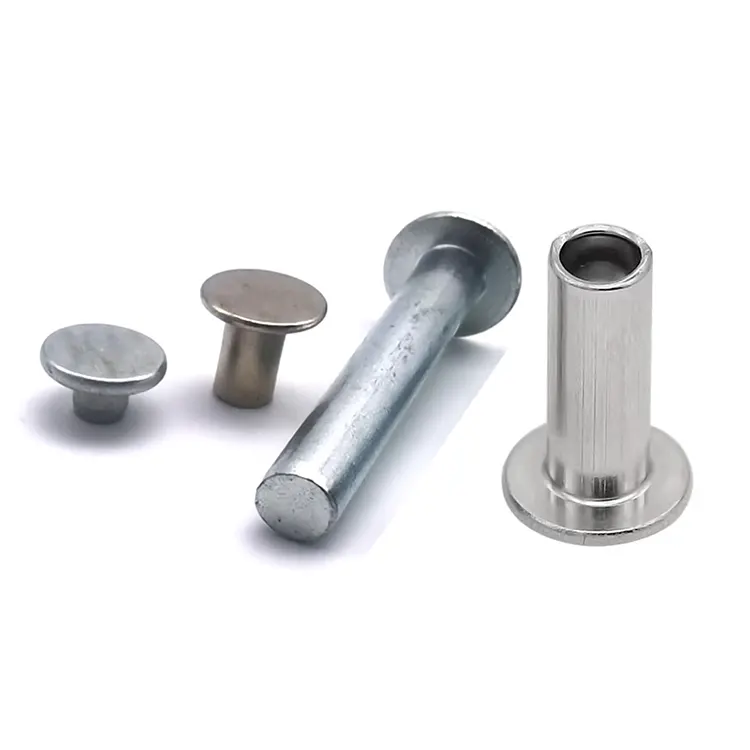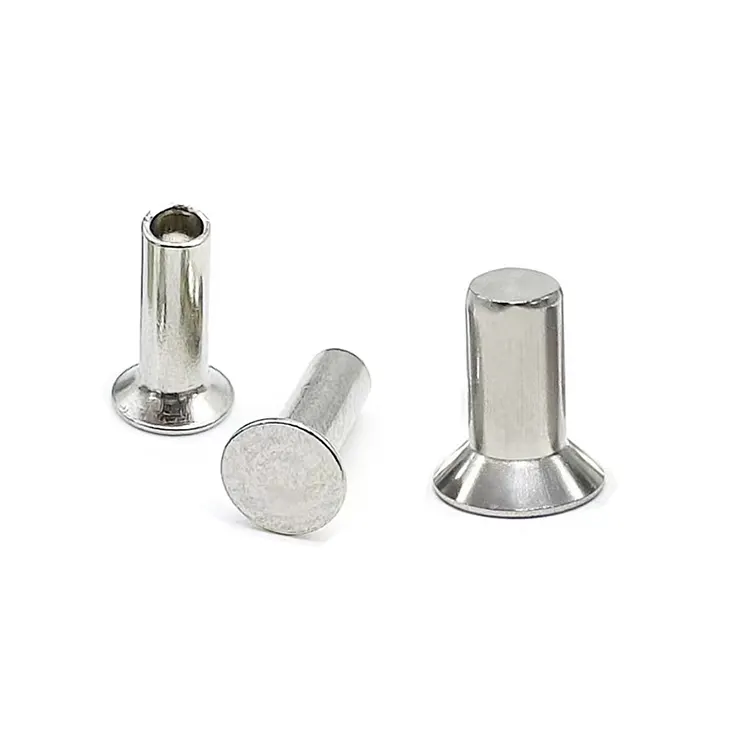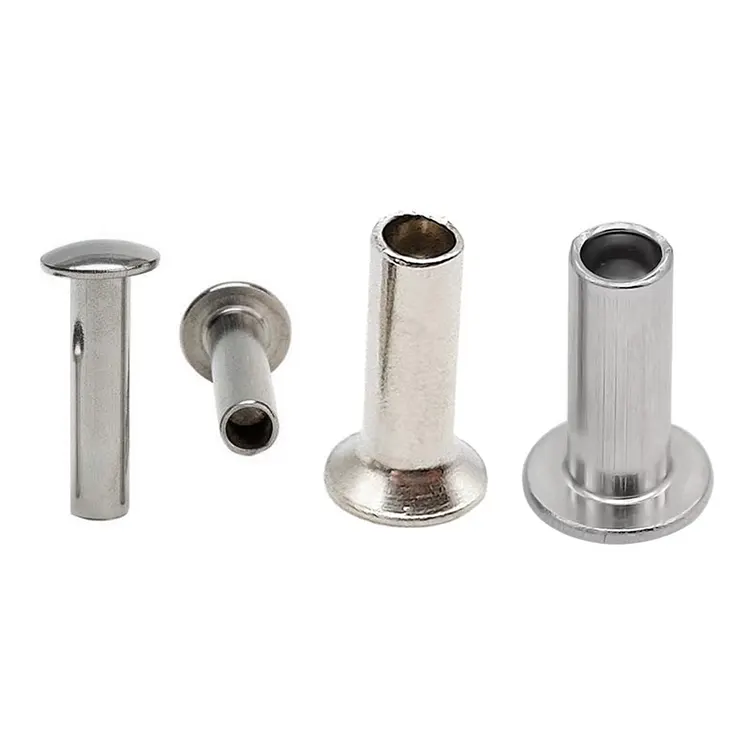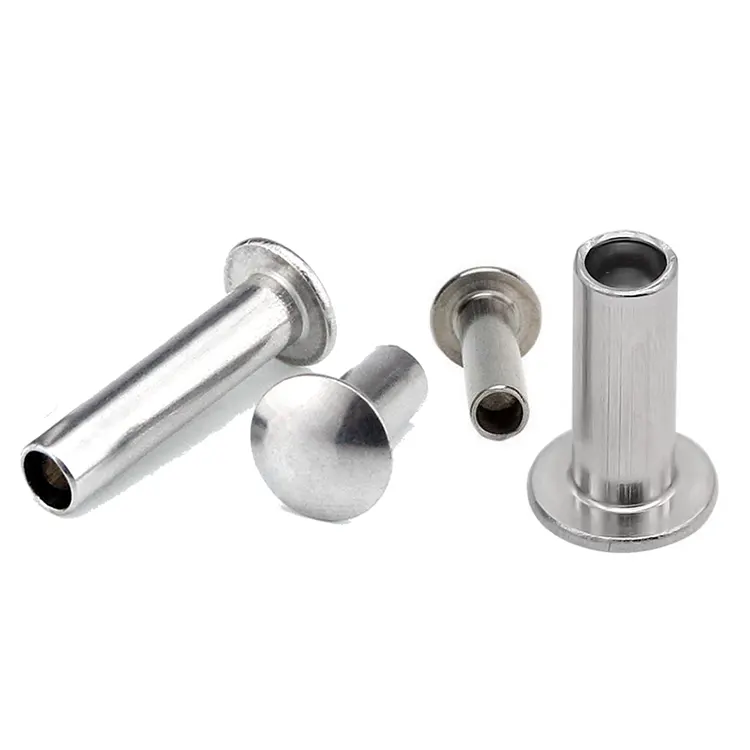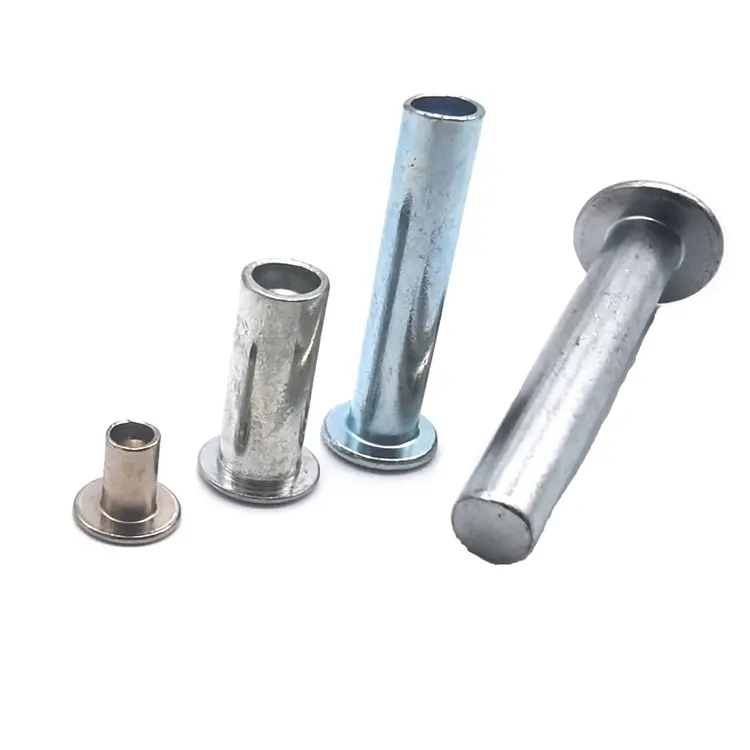Remaches
As one of professional manufacturer in China, Notin would like to provide you Rivets. And we will offer you the best after-sale service and timely delivery.
What is a rivet?
A rivet is a permanent mechanical fastener used to join two or more materials. Rivets work by inserting a metal pin into an aligned hole and deforming the end, creating a strong, secure, and durable connection. Unlike temporary fasteners like screws, rivets do not rely on threads, but instead form a permanent connection, making them ideal for applications requiring high strength, durability, and vibration resistance.
Classification of Rivets
Rivets are typically categorized by head shape, degree of hollowness, or material.
Based on head shape, rivets can be classified as flat head rivets, round head rivets, countersunk head rivets, mushroom head rivets, universal head rivets, truss head rivets, etc.

Based on degree of hollowness, rivets can be classified as solid rivets, semi-tubular rivets, or full tubular rivets.
Based on material, rivets can be classified as brass rivets, stainless steel rivets, steel rivets, aluminum rivets, copper rivets, etc.

What surface finishes are available for rivets?
Rivet surfaces are typically treated with rust-proofing treatments, primarily electroplating, including zinc plating, nickel plating, chrome plating, tin plating, gold plating, and silver plating. Electroplating is a common rust-proofing method for rivets. It applies a layer of plating to the rivet surface through physical or chemical methods. The plating effectively prevents corrosion and rust, while also providing a certain aesthetic effect.
Another special surface treatment method is head coating. Head coating is performed after the rivet is electroplated. This allows for a variety of colors on the rivet head, achieving an aesthetically pleasing finish.
Aluminum rivets cannot be electroplated, but they can be anodized. Anodizing also allows for a variety of color options, but the unit price is higher than electroplating.
Rust-proofing the rivet surface is crucial, effectively extending the rivet's service life and ensuring a secure connection. Different rust-proofing methods are suitable for different environments and applications, so the choice should be tailored to the specific situation.
- View as
Remaches de cabeza plana de hierro
Como conector mecánico común, los remaches de cabeza plana de hierro ocupan una posición importante en múltiples campos industriales debido a sus características de diseño y su amplia gama de aplicaciones. Estructuralmente, la cabeza del remache es plana, en forma de disco y el cuerpo es cilíndrico. El extremo se procesa especialmente para formar una estructura recalcada. Después de la instalación, la presión o el impacto hacen que el cuerpo se expanda, formando un acoplamiento mecánico con la pared del orificio para lograr un efecto de apriete. En comparación con los remaches de cabeza redonda o los remaches de cabeza avellanada, el diseño de cabeza plana tiene importantes ventajas en la distribución de la fuerza y el área de contacto. Por ejemplo, cuando se somete a una fuerza de corte, su cabeza en forma de disco puede dispersar la carga a un área más grande, reduciendo efectivamente la presión por unidad de área.
Leer másEnviar ConsultaRemaches de cabeza avellanada de hierro
La cabeza de un remache de cabeza avellanada de hierro tiene forma de cono truncado, con el cono típicamente en ángulo de 90° o 120° con respecto al eje del remache. Esta forma permite que la cabeza del remache quede al ras de la superficie del componente conectado después de la instalación, lo que da como resultado una apariencia suave. Esto es particularmente adecuado para aplicaciones donde la planitud de la superficie es crítica. Ven a Nuote Metals para personalizar el remache de cabeza avellanada de hierro que desees. Nuestros ingenieros, con más de 10 años de experiencia, están profundamente familiarizados con la producción de varios tipos de remaches.
Leer másEnviar ConsultaRemaches medio tubulares
Un remache medio tubular es un sujetador de metal sólido en un extremo y parcialmente hueco en el otro, generalmente hecho de materiales como aleación de aluminio, cobre o acero. La porción hueca ocupa aproximadamente de un tercio a la mitad de la longitud del cuerpo del remache. Este diseño permite que el remache logre un efecto de sujeción mediante la deformación por extrusión durante la instalación. comparado conremaches macizosLos remaches semitubulares se caracterizan por su peso ligero, fácil instalación y amplia aplicabilidad; En comparación con los remaches totalmente huecos, proporcionan mayor resistencia y estabilidad. Los remaches semitubulares no requieren equipos complejos durante la instalación y generalmente se pueden completar con herramientas manuales o neumáticas. Por lo tanto, se ven favorecidos en muchos campos. Nuote Metals se especializa en la producción de remaches semitubulares, con una gama completa de moldes y admite personalización.
Leer másEnviar ConsultaRemaches medio huecos
Nuote Metals está ubicada en Dongguan, China, nos especializamos en la producción de una variedad de remaches, incluidosremaches macizos, remaches semitubulares, yremaches tubulares completos. Los remaches semihuecos son un sujetador industrial común, que presenta una estructura de núcleo hueco con una cabeza y un vástago semicerrados. Este diseño les permite combinar ligereza y alta resistencia, lo que los hace ampliamente utilizados en aplicaciones que requieren un remachado eficiente. En comparación con los remaches macizos, los remaches semihuecos reducen el peso al utilizar menos material y, al mismo tiempo, aprovechan la deformación plástica durante el remachado para lograr una conexión segura, lo que los hace especialmente adecuados para aplicaciones sensibles al peso.
Leer másEnviar ConsultaRemaches de cabeza plana
Nuote Metals se especializa en la fabricación de remaches, produciendo una variedad de materiales como acero inoxidable, latón, aluminio, acero al carbono y cobre. Los remaches son un elemento de sujeción común que se utiliza en diversas estructuras y conjuntos tanto en la fabricación industrial como en la vida cotidiana. Los remaches de cabeza plana son el producto elegido por muchas industrias debido a su rendimiento y adaptabilidad únicos.
Leer másEnviar ConsultaRemaches de cabeza avellanada
Los remaches avellanados son un sujetador mecánico común, que se utiliza principalmente para aplicaciones de sujeción que requieren alta resistencia y una superficie lisa. Su diseño de cabeza avellanada les permite quedar al ras de la superficie de la pieza de trabajo después de la instalación, eliminando cualquier protuberancia que pueda afectar la apariencia o la función. Los remaches macizos avellanados, por otro lado, se construyen a partir de una sola pieza sólida de material, sin secciones huecas. Por lo general, se utilizan para conectar piezas de trabajo de manera profesional mediante martillazos o remachados. También hay un remache semitubular de cabeza avellanada, con una sección hueca en el extremo para remachar más fácilmente y requiere menos mano de obra que los remaches macizos.
Leer másEnviar ConsultaWhat are the advantages of rivets over other fasteners?
1. Ease of Installation
Rivets are fast to install, and even fully automated for high-volume applications, resulting in a simple and efficient operation process.
2. Connection Reliability
The riveting process is standardized, with strict quality control, resulting in highly stable connections. Visual inspection allows for quick verification of connection quality.
3. Vibration and Impact Resistance
Rivets connect through deformation or interference fit, providing strong clamping force and excellent vibration resistance, capable of withstanding vibration and shock.
4. Low Cost
Rivets are easy to install and can be fully automated, saving significant labor costs.
What are the advantages and disadvantages of rivets made of different materials?
Aluminum Rivets
Advantages: Lightweight, reduces overall product weight, low cost, suitable for general civilian applications.
Disadvantages: Low tensile and shear strength, unsuitable for high-strength workpieces, prone to electrochemical corrosion when in contact with metals such as stainless steel.
Stainless Steel Rivets
Advantages: Strong corrosion resistance, high hardness, suitable for high-strength workpieces (such as marine equipment)
Disadvantages: Higher cost, typically more expensive than aluminum rivets of the same specification.
Brass and Copper Rivets
Advantages: Excellent conductivity (such as connecting electronic components), good corrosion resistance.
Disadvantages: Higher cost, more difficult to process.
Steel Rivets
Advantages: High hardness, high connection reliability, and wide applicability.
Disadvantages: Compared to other materials, iron rivets are more prone to rusting.
What are the main applications of rivets?
Rivets have a wide range of uses, from small items like a pair of scissors to large items like airplanes and ships, as well as in high-precision medical applications.
Industrial Manufacturing
Rivets are used in a wide variety of industrial fields, wherever there is a need to connect two or more materials.
Electronics
Rivets secure heat sinks and chips, providing both vibration damping and noise reduction, and are widely used in the cooling systems of electronic products such as computers and mobile phones.
Automotive
Rivets are widely used to connect components of automobile bodies and chassis, such as doors and hoods. Their lightweight and corrosion-resistant properties make them an indispensable joining method in automotive manufacturing.
Aerospace
In aircraft manufacturing, rivets are used to connect different fuselage components, such as wings and tailplanes. Millions of rivets create high-strength, corrosion-resistant joints. Aluminum and titanium alloy rivets are often used to connect components of corresponding materials, ensuring stability in extreme environments.
Rivets are used everywhere. The above examples only represent a small number of their applications. We see rivets everywhere in our daily lives, such as on scissors, folding beds, and strollers etc. Rivets can be customized to different sizes and materials depending on the application.
Nuote Metals has specialized in the rivet industry for over a decade. Our factory is located in Dongguan, a city known as the "World Factory," a city with a developed industry and convenient transportation. This allows us to respond quickly when acquiring raw materials and supporting surface treatments, meeting our customers' needs for quick access to samples and bulk orders. We produce 10 million rivets daily and have molds of various specifications, allowing us to produce rivets as small as 0.8mm and as large as 10mm. We welcome your inquiries and visits.






